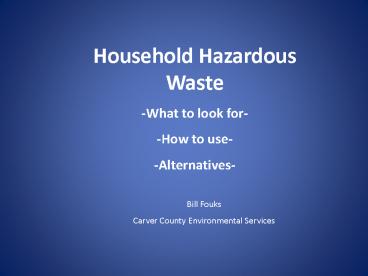Household Hazardous Waste - PowerPoint PPT Presentation
1 / 11
Title:
Household Hazardous Waste
Description:
Household Hazardous Waste-What to look for- -How to use--Alternatives-Bill Fouks Carver County Environmental Services What is HHW? Unwanted homeowner products that ... – PowerPoint PPT presentation
Number of Views:121
Avg rating:3.0/5.0
Title: Household Hazardous Waste
1
Household Hazardous Waste -What to look for-
-How to use- -Alternatives-
Bill Fouks Carver County Environmental Services
2
What is HHW?
Unwanted homeowner products that have the same
qualities as a hazardous waste described in MN
Hazardous Waste Rules
3
What are We Talking About Here? (Just Look Under
the sink or in the garage!)
- Cleaners
- Lubricants
- Paint
- Drain Openers
- Pesticides
- Fertilizers
- Mercury
- Pharmaceuticals
- Lead
- Electronic Waste
4
Environmental Concerns
- Causes leachate problems in LFs
- Causes emission problems in incinerators
- Fires in transfer stations
5
Personal Exposure Concerns
- In 2010, the Minnesota Poison Control System
received a total of 55,205 calls. - 54 of the accidental poison exposures reported
involved children under the age of 6 years old. - Acute vs. chronic exposure
- single exposure may result in severe biological
harm or death lasting no longer than a day. - continuous exposure to a toxin over an extended
period of time, often measured in months or
years may cause irreversible side effects
6
Homeowner vs. Business
- Homeowners are exempt from the HW rules but
businesses are not! - Businesses are HW generators
- must obey the HW rules.
- Can NOT throw in the trash
7
Using Hazardous Products Safely
Read the label. Look for words like caution,
warning, flammable, harmful, danger, poison.
Follow directions Dispose properly.
8
Using Hazardous Products Safely
- Look for special instructions on the label such
as - Work in well ventilated area. This means work
outside or with the windows open. The fumes can
make you sick if you do not have enough fresh
air. - Wear protective clothing. This means wear
goggles or safety glasses, gloves, long sleeves,
or other coverings. The right clothing can
prevent burns or keep chemicals from going into
your body through the skin. - Never mix products unless the label says it is
safe to do it. - For example, never mix products containing
chlorine bleach with products containing ammonia.
You will make a deadly gas by mixing these
together. - Keep children pets away while you use hazardous
products. - Always put the cap back on and put away right.
9
Using Hazardous Products Safely
- Do you store hazardous household products safely?
- Keep them away from children. A locked, secure
place is best. - Store them in the package, can, or bottle they
came in. Never put them in another container
(especially one for food or drink)! This helps
prevent poisoning and keeps the label
instructions with the product. - Keep containers and packages dry. Close them
tightly. - Set containers inside a plastic bucket in case
of leaks. - Store products at least 150 feet away from your
well, cistern, or water pump. This will protect
your water supply and your health. - Keep products away from heat, sparks, or fire.
- Always wash hands and change clothes before
eating or drinking upon using products. - Store batteries and flammable chemicals like
gasoline - in the shade, away from direct sunlight.
10
Using Hazardous Products Safely
- Safe Disposal--How do you get rid of leftover
products? - Share the extra with someone who will use it up.
- Take leftovers to a hazardous waste collection
point. - Some productslike pesticidesare very hazardous.
You will even need to be careful how you dispose
of the container. The label will tell you what to
do. - Never dump or burn hazardous products on your
property. Never burn hazardous wastes in a barrel
or stove. - Burning may let off toxic gases and make
hazardous ash and smoke. And, its against the
law in many states. - Recycle used motor oil or antifreeze
- Mercury is a threat to health. Fluorescent bulbs,
thermometers, thermostats, and blood pressure
meters should be recycled.
11
Non-Toxic Alternatives
Window Cleaner ¼ - ½ teaspoon liquid
detergent 3 Tablespoons vinegar 2 cups
water Spray bottle
Oven Cleaner 1 cup or more baking soda Water A
squirt of two of liquid detergent
All Purpose Spray Cleaner ½ teaspoon washing
soda A dab of liquid soap 2 cups hot water
Furniture Polish ½ teaspoon oil, such as olive
(or jojoba, a liquid wax) ¼ cup vinegar or fresh
lemon juice Mix ingredients in a glass jar. Use
product and cover the glass jar for storage
Creamy Soft Scrubber ½ cup baking soda Enough
liquid detergent to make texture like frosting 1
teaspoon of vegetable glycerin to store in glass
jar

